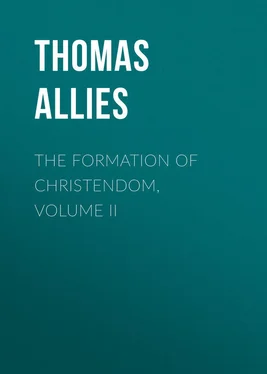Thomas Allies - The Formation of Christendom, Volume II
Здесь есть возможность читать онлайн «Thomas Allies - The Formation of Christendom, Volume II» — ознакомительный отрывок электронной книги совершенно бесплатно, а после прочтения отрывка купить полную версию. В некоторых случаях можно слушать аудио, скачать через торрент в формате fb2 и присутствует краткое содержание. Жанр: foreign_antique, foreign_prose, на английском языке. Описание произведения, (предисловие) а так же отзывы посетителей доступны на портале библиотеки ЛибКат.
- Название:The Formation of Christendom, Volume II
- Автор:
- Жанр:
- Год:неизвестен
- ISBN:нет данных
- Рейтинг книги:3 / 5. Голосов: 1
-
Избранное:Добавить в избранное
- Отзывы:
-
Ваша оценка:
- 60
- 1
- 2
- 3
- 4
- 5
The Formation of Christendom, Volume II: краткое содержание, описание и аннотация
Предлагаем к чтению аннотацию, описание, краткое содержание или предисловие (зависит от того, что написал сам автор книги «The Formation of Christendom, Volume II»). Если вы не нашли необходимую информацию о книге — напишите в комментариях, мы постараемся отыскать её.
The Formation of Christendom, Volume II — читать онлайн ознакомительный отрывок
Ниже представлен текст книги, разбитый по страницам. Система сохранения места последней прочитанной страницы, позволяет с удобством читать онлайн бесплатно книгу «The Formation of Christendom, Volume II», без необходимости каждый раз заново искать на чём Вы остановились. Поставьте закладку, и сможете в любой момент перейти на страницу, на которой закончили чтение.
Интервал:
Закладка:
4. But what was the moral influence of this multiform, universal, all-embracing, and all-penetrating worship?
Varro, whom Cicero calls the most acute and learned of writers, and whose great work in forty-one books he praises as containing the names, classes, offices, and causes of all divine and human things, divided theology into the fabulous, the natural, and the civil. In the first, he said, are many fictions unworthy of the nature and dignity of immortal beings: such as that one god sprang from the head, another from the thigh, another from drops of blood; such, again, as that gods were thieves or adulterers, or became slaves to men. In fact, this fabulous theology attributed everything to them which might happen not merely to a man, but to the most contemptible of men. 17 17 See Varro, quoted by S. Aug. De Civ. Dei , lib. vi. 5.
Let us leave what he calls natural theology, which is the discussion of philosophers concerning the physical nature of the gods, and proceed to the third, which he calls civil, and which is that which the citizens, and especially the priests of human communities, are bound to know and administer. This treats of what gods are to be worshipped, and with what rites and sacrifices. The first theology, he says, belongs to the theatre, the second to the universe, the third to the city. S. Augustine, commenting at length upon his division, proves that the first and the third, the fabulous and the civil, are, in fact, identical, since the universe is a divine work, but the theatre and the city works of men. The theatre is indeed made for the city, and the very same gods are ridiculed on the stage who are adored in the temple; the same have games exhibited in their honour and victims sacrificed to them. The images, features, ages, sexes, bearing of the gods in the one and in the other are the same. Thus this fabulous, theatrical, and scenic theology, full of everything vile and criminal, is actually a part of the civil, cohering with it as limb with limb in the same body. 18 18 De Civ. Dei , l. vi. 5, 6, 7.
Conceive, then, every revolting detail of adultery, prostitution, incest, or of dishonesty, or of violence, which the perverted invention of modern writers has ever dressed up for the theatres of great cities in this and other countries. They will perhaps yield in turpitude to that which the theatres of the Roman empire exhibited. But what these theatres represented in mimic action was the exact image, as reflected in a mirror, of what was transacted at the solemn service of the gods in unnumbered temples. 19 19 “Illam theatricam et fabulosam theologiam ab ista civili pendere noverunt, et ei de carminibus poetarum tanquam de speculo resultare: et ideo ista exposita, quam damnare non audent, illam ejus imaginem liberius arguunt.” De Civ. Dei , vi. 9; id. vi. 7.
The exact image so far as it went, yet stopping short in some respects, for our eye-witness above cited declares that gratitude was due to the actors, inasmuch as they spared the eyes of men, and did not lay bare upon the theatre all that was hidden within the walls of temples. It was not enough, then, that all the many games and spectacles in which such things were represented were dedicated to the gods, acted under their especial sanction, even enjoined by them as means of gaining their favour or averting their wrath, which alone would have made them answerable for the immorality so portrayed; not enough, even, that actions of this quality were in the theatres ascribed to the gods who presided over them; but these acts of immorality were not the fictions of poets or the acting of players, but the very substance of the theology itself in which the worship of all these nations was embodied. Priapus appeared to make a laugh on the stage exactly in the costume in which he was worshipped in the temples, or in which he entered into the rites of marriage; a costume of indescribable turpitude, the shame of our human nature. The players on the stage and the statues in the temples equally exhibited Jove bearded and Mercury beardless, Saturn in decrepitude and Apollo in youthful beauty. In the rites of Juno, of Ceres, of Venus, of the mother of the gods, words were uttered and scenes acted such as no decent person would suffer to be spoken or acted before his own mother; or rather they contained, as a portion of themselves, the worst crimes which the theatres represented; nay, crimes which they stopped short of acting, and persons so infamous that they were not tolerated even on the stage, where yet to take part was a civil dishonour. What, then, was the nature of those rites wherein those were chosen to take part whom the utmost license of the stage banished from its boards? 20 20 “Quæ sunt ergo illa sacra quibus agendis tales elegit sanctitas quales nec thymelica in se admittit obscœnitas.” De Civ. Dei , vi. 7.
Let us conceive – if such a conception can be adequately represented to the mind – that the vilest drama ever acted upon a modern theatre was being daily carried on in all the churches of Christendom by troops of priests and priestesses, with all the paraphernalia of costliest worship, with prayers, invocation, and sacrifices, as a service acceptable to the Ruler of man's lot, and as an account of what that ruler had Himself done, and of what He loved to be imitated by others. That would be a picture of heathen worship in the time of Augustus; that would be the moral food on which was nurtured that crowd of nations which acknowledged Cæsar's sway; that the conception of divine things wrought into the minds of the hundred millions of men who formed the Roman empire.
Was it surprising that all worshippers of the gods should look for their example rather in Jupiter's actions than in Plato's teaching or the moral judgments of Cato? 21 21 “Omnes cultores talium deorum – magis intuentur quid Jupiter fecerit, quam quid docuerit Plato vel censuerit Cato.” De Civ. Dei , ii. 7.
A nature subject in itself to the sway of passion was stimulated by an authority supposed to be divine to the commission of every criminal excess; and herein lay a strong proof of the malignant and impure character of these gods.
On the other hand, the same eye-witness challenges the defenders of the pagan gods to produce a single instance wherein moral precepts of living were delivered to their worshippers upon divine authority. True, indeed, there were here and there whispers of secret rites in which a pure and chaste life was recommended, but where were the buildings dedicated to the public preaching of such truths? Places there were in abundance consecrated to the celebration of infamous games, rightly termed “Fugalia,” since they put modesty and decency to flight, but none where the people might listen to divine commands repressing avarice, ambition, or unchaste desire. Thus with the positive inculcation of all evil, under cover of their own example, was united the negative absence of all moral teaching. 22 22 De Civ. Dei , ii. 6. “Demonstrentur vel commemorentur loca – ubi populi audirent quid dii præciperent de cohibenda avaritia, ambitione frangenda, luxuria refrænanda.” See also sec. 28.
For even the prayers which accompanied these sacrifices and this ceremonial, and this lavish exhibition of every human wickedness under divine names, were not addressed for moral goods, but for wealth, bodily strength, temporal prosperity. Horace but expresses the general mind when he says:
“Sed satis est orare Jovem quæ donat et anfert;
Det vitam, det opes, æquum mi animum ipse parabo.”
( Epist. i. 18, 111.)They were moreover viewed as carrying with them a sort of physical force, not as prevailing through purity of intention in those who offered them. In fact, the gods to whom they were addressed were powers of nature, or malignant and impure powers, but in neither case beings who looked for a moral service from rational creatures.
Читать дальшеИнтервал:
Закладка:
Похожие книги на «The Formation of Christendom, Volume II»
Представляем Вашему вниманию похожие книги на «The Formation of Christendom, Volume II» списком для выбора. Мы отобрали схожую по названию и смыслу литературу в надежде предоставить читателям больше вариантов отыскать новые, интересные, ещё непрочитанные произведения.
Обсуждение, отзывы о книге «The Formation of Christendom, Volume II» и просто собственные мнения читателей. Оставьте ваши комментарии, напишите, что Вы думаете о произведении, его смысле или главных героях. Укажите что конкретно понравилось, а что нет, и почему Вы так считаете.












